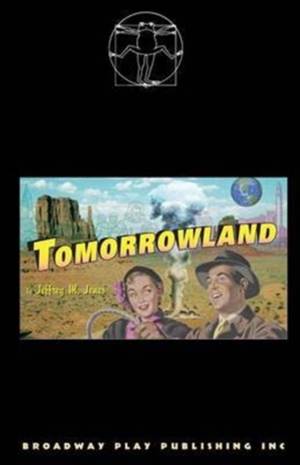
- Retrait gratuit dans votre magasin Club
- 7.000.000 titres dans notre catalogue
- Payer en toute sécurité
- Toujours un magasin près de chez vous
- Retrait gratuit dans votre magasin Club
- 7.000.0000 titres dans notre catalogue
- Payer en toute sécurité
- Toujours un magasin près de chez vous
Description
Virtually all of the dialogue in this play has been constructed out of source material dating from the year 1950, and what it reveals is an America in which perception and reality are frequently at odds. "Even paranoids have enemies, goes the old joke; Jeffrey M Jones's TOMORROWLAND is a ninety-minute incarnation of that line. The second of his projected trilogy, 'A History of Western Philosophy, ' this piece is a logical sequel to Jones's first installment, DER INKA VON PERU, which romped through colonial history and western literature, juxtaposing a Harlequin romance with a William Prescott adventure tale on a peephole stage: a blank wall with a hole in it revealed an upstage wall with a smaller hole. TOMORROWLAND tightens the focus implied by that telescoping set, concentrating on postwar America in a suburban living room with an upstage window. Beyond it stretches the Moon's surface, full of promise, and the earth rises in the distance. Like DER INKA, TOMORROWLAND is a verbal collage; its dialogue, says a program note, 'was constructed from source material all dating from the year 1950.' Movies, T V game shows, advertisements, H-bomb descriptions, the Fuchs spy trial, Korean war reports, and McCarthy's charges of communism in the State Department are the found objects from which Jones sculpts his ominous image of American anxiety. Three interweaving plots-a western in which Jimmy Ringo hunts down an outlaw, a sci-fi thriller about extra-terrestrials spying on earth, and a family sitcom-depict the exuberant optimism of the American Dream at the advent of frozen orange juice, television and suburbs. Guided by Television Star Shannon Malleson, we visit the Wilfred family in their Delray Beach, Florida, home, where Jason complains from his easy chair about his country's wimpy defense. Carol makes Wednesday her casserole day and imagines creatures in her backyard, and their daughter, Divina, asks her dad about the Cold War and has a study date with Selden, the high school football star. The characters' fears edge seamlessly into paranoia as the family scenes dissolve into the western in which Jason plays the gunman, Selden the outlaw, Carol and Divina their devoted girls. Shannon and her co-narrator, a health department doctor, provide an ironic point of view that deepens the play's obvious connections between red scares and cowboy heroics. Doubling as the aliens who inspect Earth after its (presumably nuclear) destruction, Shannon and Dr Sinclair, always cheery, offer hysterical warnings of modern horrors: communism, polio, madness, radiation, and body odor. Daniel Moses Schreier's relentless soundtrack underscores the intersecting genres with electronic music, homey Muzak, and cowboy arpeggios, all maintaining the same even rhythm. Jones has paced TOMORROWLAND, unlike the frenzied DER INKA, with uninterrupted smoothness, creating some lulls, but he gets textured performances from Barbara Somerville as Divina, Karla Barker as Shannon, and especially, as Jason, Zach Grenier, whose repellent charisma makes him the quintessential actor for Jones' sleazy heroes. Near the play's end, crazy Carol confesses her role in a spy scheme, describing her experience as 'controlled schizophrenia, ' which could describe equally well Jones's diagnosis of the U S and his multi-focus dramatic form. If at times Jones' ideas about theater and history rise to the surface of this play more than they issue out of its action, that's a welcome improvement over similar experiments (even DER INKA, to some extent) whose complex issues are peripheral to their cleverness. Jones's vision, alas, is as intelligent as it is bleak." -Alisa Solomon, The Village Voice
Spécifications
Parties prenantes
- Auteur(s) :
- Editeur:
Contenu
- Nombre de pages :
- 102
- Langue:
- Anglais
Caractéristiques
- EAN:
- 9780881453010
- Date de parution :
- 15-09-07
- Format:
- Livre broché
- Format numérique:
- Trade paperback (VS)
- Dimensions :
- 140 mm x 216 mm
- Poids :
- 127 g

Les avis
Nous publions uniquement les avis qui respectent les conditions requises. Consultez nos conditions pour les avis.






